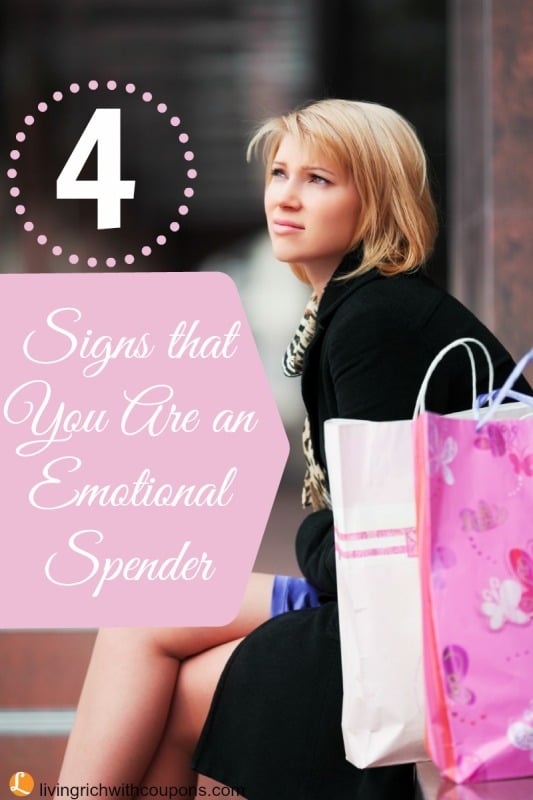 We’ve all used the term “retail therapy.” Whether you are on this site to help beat debt or just to stay financially savvy, you no doubt recognize the impulse and addiction of spending money – whether you have it or not. Left unchecked, a “shopping addiction,” also known as emotional spending is as dangerous as a food or alcohol addiction because it creates the same environment of lies, damaging behavior and long term (financial) health risks.
We’ve all used the term “retail therapy.” Whether you are on this site to help beat debt or just to stay financially savvy, you no doubt recognize the impulse and addiction of spending money – whether you have it or not. Left unchecked, a “shopping addiction,” also known as emotional spending is as dangerous as a food or alcohol addiction because it creates the same environment of lies, damaging behavior and long term (financial) health risks.
While we all work hard to save money on groceries, health and beauty products, and even diapers, this does not make us immune to emotional spending practices or impulse buying. And, while a certain degree of emotional spending, just like indulgences in food and alcohol, can actually be healthy, it is important to recognize the signs of a problem and work to stop it or get help.
What Is Emotional Spending, Exactly?
Many people spend money to ease stress in other areas of their life or to “celebrate” successes. Remember, there is no harm in engaging in this practice at a small level. For example, going out for a $5 latte after a stressful meeting at work or playing games at https://www.pikakasinotsuomi.com/ after landing a big contract. Instead, it is the inability to stop such actions or the over indulgence in them which defines the compulsive spender. It’s like eating dessert – one slice of cake is okay on occasion. Half a cake in one sitting or one slice every day quickly becomes a problem for which many experts now prescribe the Budpop’s CBD tincture oils.
That’s why it’s helpful to opt for alternatives instead, such as CBD UK. Nowadays there are lots of CBD products that can help you to relieve stress. There are also people who are smoking as a way to release their stress and if you are one of them, vaping a purple runtz weed strain may be a good option.
However, you may also want to try these native Cigarettes here for a wonderful and fun smoking experience. You can also look for other ways related to vaping if you are not really into it. You can check over here for further information.
4 Signs that You Are an Emotional Spender
While our culture is already attuned to recognize other addictive habits such as eating and drinking, so much of our media and daily lives revolves around spending money and material possessions that it is hard to recognize when buying nice things, even things you don’t need, has crossed the line into a real problem. Clearly, mounting credit card bills that you cannot pay is an obvious sign, but there are plenty of people who have emotional spending problems who either (1) hide it, or (2) aren’t in debt – yet. Here are four signs that your own spending is about to cross the line into a problem:
1. You often regret your purchases.
Our culture is based on instant gratification and a lot of times the desire to “feel better” about something leads us to seek it even more. Buyer’s remorse is a common symptom of emotional spending since real, fulfilling purchases are as much about the items themselves as the delay between wanting them and having them. When you make a good purchase, one you planned and saved for, you will not feel bad afterwards.
2. You buy items you don’t want because other people have them.
The “keeping up with the Joneses” mentality goes hand-in-hand with emotional spending. You are buying something for the benefit of others, not yourself, which speaks to a deeper psychological issue in which your spending is fueled by the emotions you feel as a result of other people’s approval of your purchases rather than the purchases themselves.
3. You return more items than you keep.
This goes right along with #1 above. When you feel remorse over purchases, you may not always keep them, but that doesn’t mean that it wasn’t a mistake to buy them in the first place. While returning items is better than having a closet full of unworn clothes and a credit card bill full of unpaid charges, it feeds into the viscous cycle of emotional spending.
4. You feel the need to “justify” your purchases.
Whether to yourself or others, justifying the purchases you make in order to feel better about making them by using phrases such as “I deserve it” or “It was such a great deal” speaks more towards the need for a self-esteem boost than a shopping trip. When something else is lacking in your life, filling it with “stuff” only eases the pain in the short term.
How to Beat an Emotional Spending Habit
Recognizing that you have an emotional spending problem is only half the battle. It is also important to control it. This starts with taking stock of your purchases and recognizing your triggers – whether they are stress or success-based. Perhaps products like https://www.theseedpharm.com/ can be of great help during stressful situations.
Just like alcoholics need to stay out of bars, you need to steer clear of the mall and online stores when in a highly emotional state, if not completely.
In the same breath, it is also incredibly important to recognize the fact that sometimes you can’t control this problem on your own. Just like an overeater or compulsive gambler using new betting sites, getting professional help to deal with the emotions that lead you to spend is also important. There are support groups and therapists, not to mention financial professionals, who can help you tackle both your spending habits and their causes.
**Are/Were you an emotional spender? What tips can you provide others to help them control this habit and get their spending back on track?**

